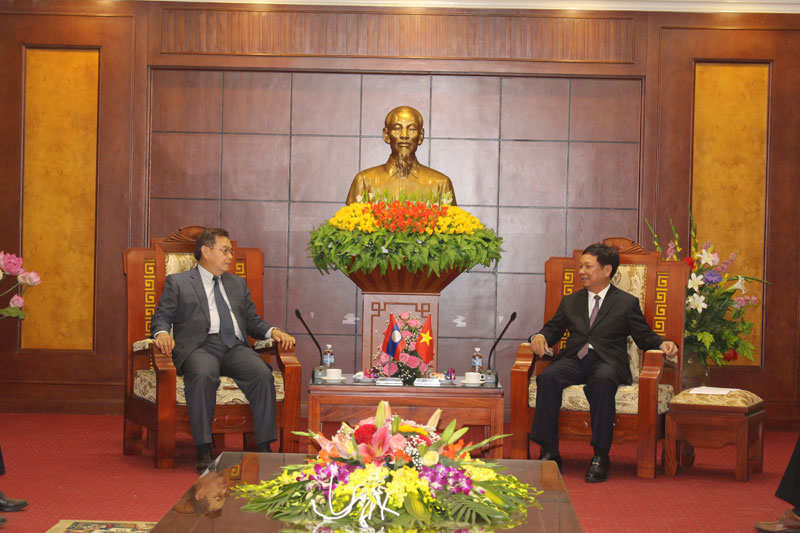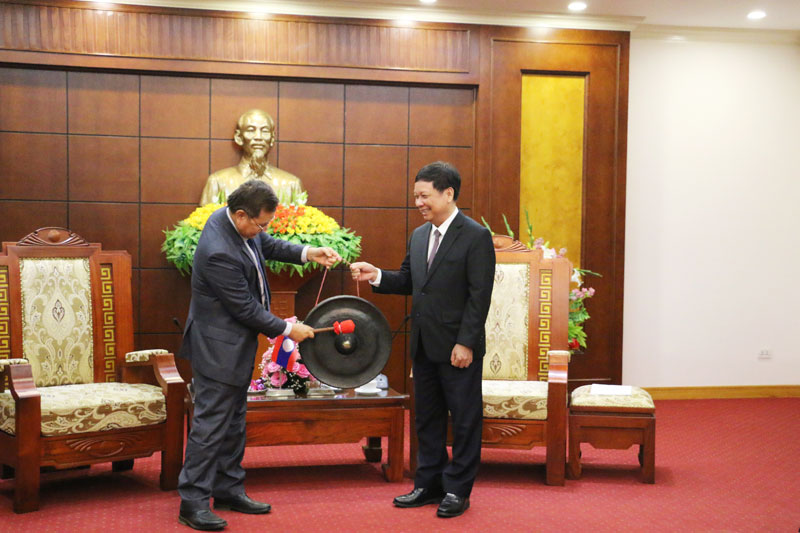
HBO – A high-level delegation of the Lao Front for National Construction Central Committee led by its President-Politburo member Xaysomphone Phomvihane recently paid a working visit to Hoa Binh province.
The delegation was received by Party Central Committee member and
Secretary of the provincial Party Committee Bui Van Tinh; Vice Chairman of the
provincial People’s Committee Nguyen Van Chuong; Vice Chairman of the People’s
Council Hoang Van Tu; and leaders of the Vietnam Fatherland Front – Hoa Binh chapter.

Provincial
leaders host a reception and working session with the delegation of Lao Front
for National Construction.
At the working session, Secretary of the provincial Party
Committee Bui Van Tinh warmly welcomed President of the Lao Front for National
Construction Central Committee Xaysomphone Phomvihane and the delegation. He
stressed that Vietnam and Laos have always been side by side and and cooperated
for mutual development over the years.
The historical stele relic site at Hoa Binh province’s Military
Command headquarters, where the preparatory conference of the second congress
of the Lao People’s Revolutionary Party was held, is a manifestation for the
close and special bond between the Vietnamese and Lao revolutions and the two
nations, he affirmed.
Hoa Binh province has organised a series of diplomatic activities
and boosted development cooperation with Lao localities, Tinh said, adding that
the province’s Party organisation, administration and people will do their
utmost to contribute to maintaining and developing the solidarity and
friendship between the two Parties and States.

Secretary
of the provincial Party Committee Bui Van Tinh presents gift to President of
the Lao Front for National Construction Central Committee Xaysomphone
Phomvihane.
On behalf of the Lao delegation, delegation, Politburo member and President
of the Lao Front for National Construction Central Committee Xaysomphone
Phomvihane thanked Hoa Binh province’s authorities and people for the warm
welcome.
He expressed his hope that the special friendship and solidarity and
comprehensive cooperation between Hoa Binh and Laos in particular and between
Vietnam and Laos in general will last forever.
He proposed that Hoa Binh’s leaders intensify cooperation with Lao
localities in economics, especially in farming and husbandry, assist the Lao
side in official training and cultural, sport and tourism development, and
maintain information exchange on historical relic sites.
The Lao Front leader wished Hoa Binh leaders and people good
health, happiness and more success in the national building and safeguarding
cause./.
Hoa Binh province is undergoing a dynamic transformation amid Vietnam’s national digital transition. Building on Poliburo’s Resolution No. 57-NQ/TW on breakthroughs in science, technology, innovation, and national digital transformation, the province has rolled out a wide range of practical action plans. A standout initiative is the "Digital Literacy for All” movement, an effort to ensure that no one is left behind in the digital era.
Hoa Binh province is undergoing a dynamic transformation in the wake of the national digital transformation movement. Building on Resolution No. 57-NQ/TW of the Politburo on breakthroughs in science, technology, innovation, and national digital transformation, the province has implemented a wide range of practical action plans. A standout initiative is the "Digital Literacy for All” movement ambitious effort to ensure that no one is left behind in the digital age.
With a spirit of unity and proactive problem-solving, the Party Committee, the government and the people of Dong Lai Commune (Tan Lac District) have made great strides in implementing the resolutions of the 24th Party Congress of the commune for the 2020 - 2025 term. Focusing on leadership and practical actions, the commune has brought the Party’s resolutions into daily life, creating strong impacts and pushing the local development forward.
Amid the nationwide push for digital transformation, young people in Hoa Binh Province are stepping up as dynamic pioneers, applying technology to enhance Youth Union operations and expand the reach of youth-led initiatives. Through creativity and adaptability, Youth Union organizations at all levels have introduced a series of practical solutions, contributing to modern governance and community development.
In recent years, An Nghia commune, located in Lac Son district, has stepped up administrative reform, focusing on improving the quality and efficiency of its single-window service unit for receiving and processing administrative procedures. These improvements have helped create favourable conditions for local residents and organisations to handle administrative procedures, contributing to the commune’s broader socio-economic development.
The Prime Minister-approved master plan to develop the multi-use value of forests ecosystems through 2030, with a vision to 2050, aims to improve the management and sustainable use of forest resources, create jobs, increase incomes, and improve the living standards of ethnic minorities, people in mountainous and remote areas, forest workers and those living near forests.




